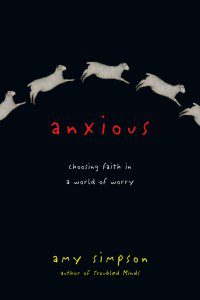 We are a society dominated by worry. In many ways, North Americans have never been more affluent, protected, and secure. Yet, no people have been more preoccupied by weather worries, despite the warmth of our homes and availability of weather predictions. Germs terrify us despite better hygiene and greater longevity than previous generations. Parents are fearful for their children’s safety even in the front yards of their safe communities. With mortality comes risk, but are our worries inordinate? Fear is big business and cable television, the makers of alarm systems and hand sanitizers, and insurance companies create and capitalize on our need to be in control and escape the challenges of mortality. We are a fear-addicted society. Although anxiety disorders trouble many people, the majority of us fall into the categories of “worried well” and “anxious affluent.”
We are a society dominated by worry. In many ways, North Americans have never been more affluent, protected, and secure. Yet, no people have been more preoccupied by weather worries, despite the warmth of our homes and availability of weather predictions. Germs terrify us despite better hygiene and greater longevity than previous generations. Parents are fearful for their children’s safety even in the front yards of their safe communities. With mortality comes risk, but are our worries inordinate? Fear is big business and cable television, the makers of alarm systems and hand sanitizers, and insurance companies create and capitalize on our need to be in control and escape the challenges of mortality. We are a fear-addicted society. Although anxiety disorders trouble many people, the majority of us fall into the categories of “worried well” and “anxious affluent.”
In her recently-released text Anxious: Choosing Faith in a World of Anxiety, Amy Simpson sees anxiety as a matter of trust and faith. While I am not sure that God is “offended” by our worries, as she asserts, many of our worries reflect our failure to trust in God’s goodness and loving care. I believe that living with the Serenity Prayer can provide on antidote to a life of worry.
The short version of the Serenity Prayer, penned by Reinhold Niebuhr, counsels:
God, grant me the serenity to accept the things I cannot change, the courage to change the things I can, and wisdom to know the difference.
Part of our addiction to worry comes from our need to be in control, and to have powers as mortals that are often attributed to God. We all need to ponder what we cannot change, and then adapt, leave, or let go. The other day I talked about the Serenity Prayer in our congregation’s “Time for All God’s Children” (also known as the Children’s Sermon). The children and youth as well as their elders placed “weather,” “birth,” “DNA,” “ethnicity,” and “other people” in this category. Resigning from God, as the Serenity Prayer suggests, enables us to have a healthy active realism that calms our spirits and inspires agency. Trying to control the uncontrollable condemns us to a life of fear and worry.
The Serenity Prayer also invites us to consider “the courage to change the things I can” and let go of what is beyond our powers. It also reminds us that trusting a Greater Power, the divine, helps us to deal creatively with life’s most difficult problems. Psychiatrist and Holocaust survivor Victor Frankl provides insight into our quest for serenity: “Everything can be taken from a man but one thing: the last of the human freedoms—to choose one’s attitude in any given set of circumstances, to choose one’s own way.” Frankl adds, “When we are no longer able to change a situation, we are challenged to change ourselves.” Frankl suggests that realistically recognizing life’s limits can be a catalyst to appropriate agency.
Serenity, and freedom from worry, emerges from a trust in God and in our selves. We gain greater perspective and patience with the circumstances of our lives when we leave the big questions of life to God. Our times are in God’s hands, and God is faithful. When we believe that nothing can separate us from the love of God, we can live with failure and mortality. We can find inner peace and contentment amid life’s challenges. Ultimately the Serenity Prayer inspires us to focus on our inner life, our relationship with God, and our ability to be God’s partners in transforming the world.
Take a moment to meditate on the Reinhold Niebuhr’s complete version of the Serenity Prayer. Let it be a pathway to contentment in a world of worry:
God grant me the serenity to accept the things I cannot change,
The courage to change the things I can,
And wisdom to know the difference.
Living one day at a time,
Enjoying one moment at a time,
Accepting hardship as a pathway to peace,
Taking, as Jesus did,
This sinful world as it is,
Not as I would have it,
Trusting that You will make all things right,
If I surrender to Your will,
So that I may be reasonably happy in this life,
And supremely happy with You forever in the next. Amen.
Claiming our freedom and agency in a world of limits is, as Amy Simpson counsels, the gift of “choosing faith in a world of worry.”
Read an excerpt from the book Anxious at the Patheos Book Club here.












